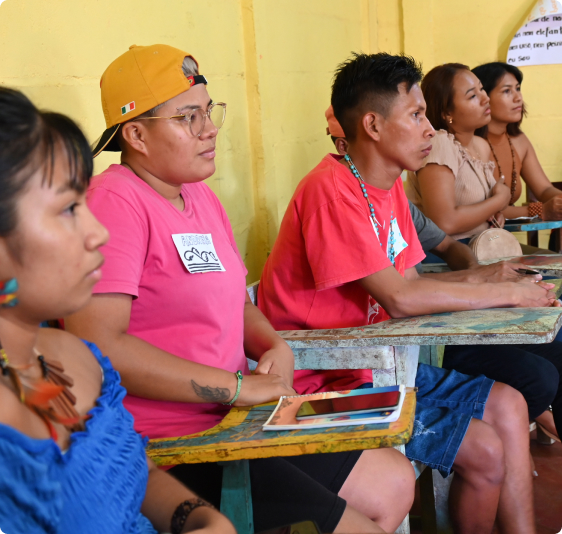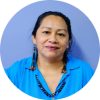


SETA REPRESENTS OUR AMBITION FOR CHANGE AND AGILITY.
of the Brazilian population identify racism, color and ethnicity as the main cause of inequality
of Brazilians live with people who suffer racism
who suffered racism point to school/college/university as places where this violence occurred
are in favor of reserving places in higher education, public sector competitions and jobs in private companies for the black and/or indigenous population
The SETA Project systematically promotes the voice, agency and leadership of black, indigenous and quilombola groups and people.
Our mission is to transform the ecosystem of public education in Brazil and institutionalize an approach to racial and gender equity in policy and practice. We will work to achieve the following six outcomes:

















ActionAid Program & Policy Director and SETA project coordinator

We understand the need for schools to be a space to combat racism, to offer the same treatment to children and adolescents who come from different places, with different stories. The project brings together groups, intelligence and experiences in favor of racial equity education.
Coordinator of Geledés - Black Women's Institute

Anti-racist education must be understood as a duty and a commitment of all people committed to education. It is supported by constitutional principles, educational legislation, the set of National Curriculum Guidelines for Basic Education (DCNs), and the National Plan on Education (PNE).
Coordinator of the National Campaign for the Right to Education

The discourse on anti-racist education has grown in public opinion and in society, but we are still far from making this a reality. SETA will drive this revolution through a union of efforts by entities deeply committed to the anti-racist agenda.
Coordinator of Makira-E'ta - Network for the Articulation of Indigenous Teachers of the State of Amazonas

The school of today is not the school of yesterday. We need to innovate students' learning and recognize that indigenous peoples in Brazil are many and varied. That have their own organizations, different languages, different cosmologies and worldviews, ways of doing, thinking, and representing.
Coordinator of CONAQ - National Coordination for the Articulation of Black Rural Quilombola Communities

May we reduce this inequality that exists in the country and actually work towards racial equity that addresses both the issues of education, health, income generation and the black population's access to good living.
Deputy Executive Coordinator of Educational Action

There is still immense resistance in society and education systems to the implementation of these legal achievements. The change we seek is paradigmatic and requires constituting a global transformation process that addresses the different dimensions of schools and educational policies.
UNEafro Brasil

The SETA Project brings together those who historically build multidisciplinary strategies to put anti-racist education into practice at the center of public debate. It is a set of efforts from different entities for Racial Equity in Education and it is through this sum that we strengthen ourselves and move forward.
SETA Project was built by an unprecedented alliance of organizations with vast experience and anti-racist education actions. This work in coalition continues to dialogue with other projects and organizations across the country that operate in formal or non-formal education spaces with the aim of tackling inequalities in these environments.

Articles
Action Aid International in partnership with the University of Bristol is seeking to facilitate connections and knowledge-sharing between anti-racist activists,…

Articles
David Archer Abstract The failure to address strategic issues in the financing of education is undermining progress towards SDG4. The…

Articles
Highlights The absent presence of race in development reflects how issues of race and racism are erased from discourses about…
We have put together the answers to your main questions into categories. Just click on the subject you are looking for to filter the questions already answered.
Structural racism in Brazil has systemically hindered access to the right to equal and quality public education by black, quilombola and indigenous students. The quality of education that children receive in Brazil is deeply segmented by racial and socioeconomic status. And, today, it is identified that the gaps between white children and black, quilombola and indigenous children, in all basic education indicators, are persistent and more serious for young people aged 11 to 17. Black, quilombola and indigenous children and young people are the most likely to drop out of school, have higher exclusion rates and have lower educational levels. Therefore, they are assigned the less prestigious and lower-paying jobs as adults. Meanwhile, white students internalize the racial inequities they are exposed to in schools and replicate them as adults. When looking at learning indicators, it is also concluded that there are not only more barriers to accessing school for black, quilombola and indigenous children, but that once at school, these children are less likely to access quality education.
The SETA Project seeks to carry out transformative actions based on evidence resulting from studies that help to understand the complexity of racial relations in the country and the resulting problems that need to be faced. In this sense, it foresees a series of studies with national and regional perspectives in its territories of intervention, especially in Amazonas, Maranhão, Rio de Janeiro and São Paulo. The objective is to map the perception of society in general, of education professionals and students about racism, racial inequalities in general and in education, the effectiveness of policies to combat racism, the gaps in tools and methodologies to promote racial equity and successful strategies and good national and international practices that can inspire actions to value diversity and differences and mitigate inequalities, especially in the area of education.
1) Biannual public mapping survey on perceptions of racism in Brazilian society.
2) Biannual focus groups on school communities’ perceptions of racism.
3) Monitoring and evaluation of educational indicators with analysis of education indicators focusing on race, gender and territory.
4) Studies led by the organizations that make up the SETA Project on “indigenous school education”, “quilombola school education”, “educational trajectory of black girls”, “black youth, education and violence”, “impact of secondary education reform on deepening of educational inequalities” and “participatory construction of indicators and diagnosis on quality in education and racial relations”.
All of these productions are/will be made publicly available to assist society in the construction of qualified narratives, based on the portrait of reality, in defense of racial equity in education, in addition to guiding project actions.